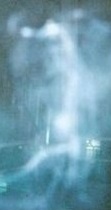The two psychiatric carers stood at the one-way mirror.
The men were observing a patient who continually prattled away to himself. More to the point, he would have extended periods of carrying out a conversation with an invisible friend. They were analysing a man that in layman’s terms would be regarded as an oddball. He was in the middle of one of these chats when the speaker was switched on.
The patient was saying, “You’re right, of course, but the problem with obfuscation is that a message’s hidden meaning may very well stay that way. Not always a good thing of course, when it could be important.”
The patient stood listening for a while, as if listening to what the other was saying.
He replied, “Yes. Yes, I know, but the drawback with having scruples is that moral considerations may well deter a person from taking action when it’s needed.”
More silence.
“Well, that’s like considering the chances of you tossing a coin and it landing on its edge, eh?”

He stood listening to the reply, with a smile on his face.
“Anyway, what else has been happening.”
A long period of thoughtful silence, followed by a shaking of his head.
“Interesting, but of course, there are seasons that go way beyond climate.”
The listeners frowned at one another.
The patient went on.
“It’s good that they had good weather for it, but the trouble with photographs is that a two-dimensional depiction just doesn’t really cut the mustard, does it?”
He stood perfectly still again; listening.
“Well, OK. I suppose it’s nice to have them. Possession is everything, I suppose…”
He looked as though he’d been interrupted. He then wagged his head from side to side and went on.
“You know what they say, that if you do walk a mile in someone’s shoes you are probably far enough away, that you can keep them.”
He chuckled at whatever response he got.
“And her, how did she take it?”
He listened intently.
“That’s to be expected, I guess. She really does struggle through her entire life with a headache coming on.”
He laughs; presumably, they are both laughing. He listens again.
“That too. She was always a stickler for a strict level of security.”
Listening again.
“Well, it’s funny you should say that, because a man living just up the road from where I used to live told me he had four locks running down the door of his apartment. He says he only locks two of them when he leaves. That way, anyone picking the locks would keep locking two of them up again.”
One doctor turned to the other and said, “Wow! Did you hear that? In some strange way, that actually make’s sense…”
The other raised both eyebrows, and said, “You know, it really is best if we don’t get involved…”









